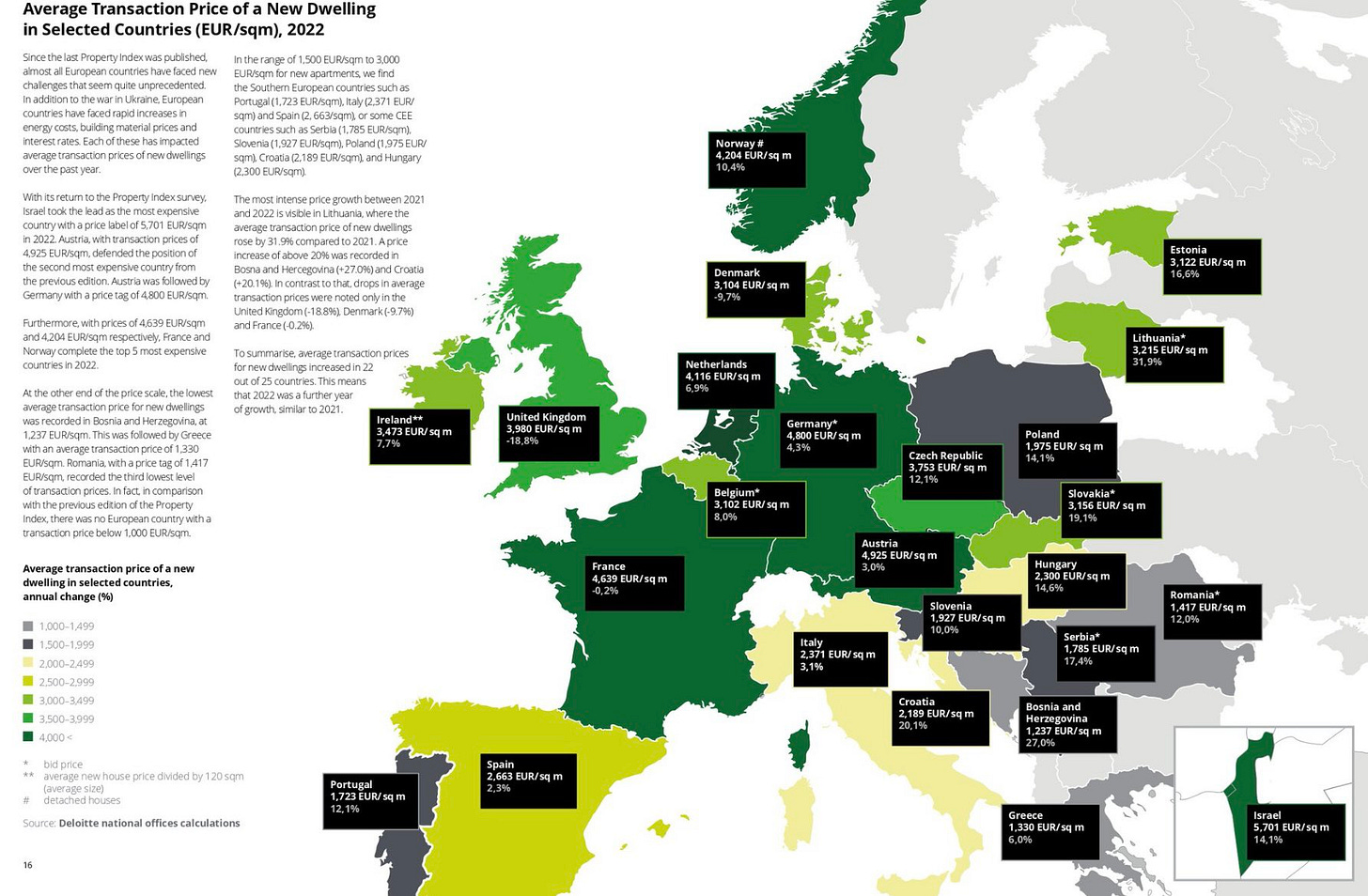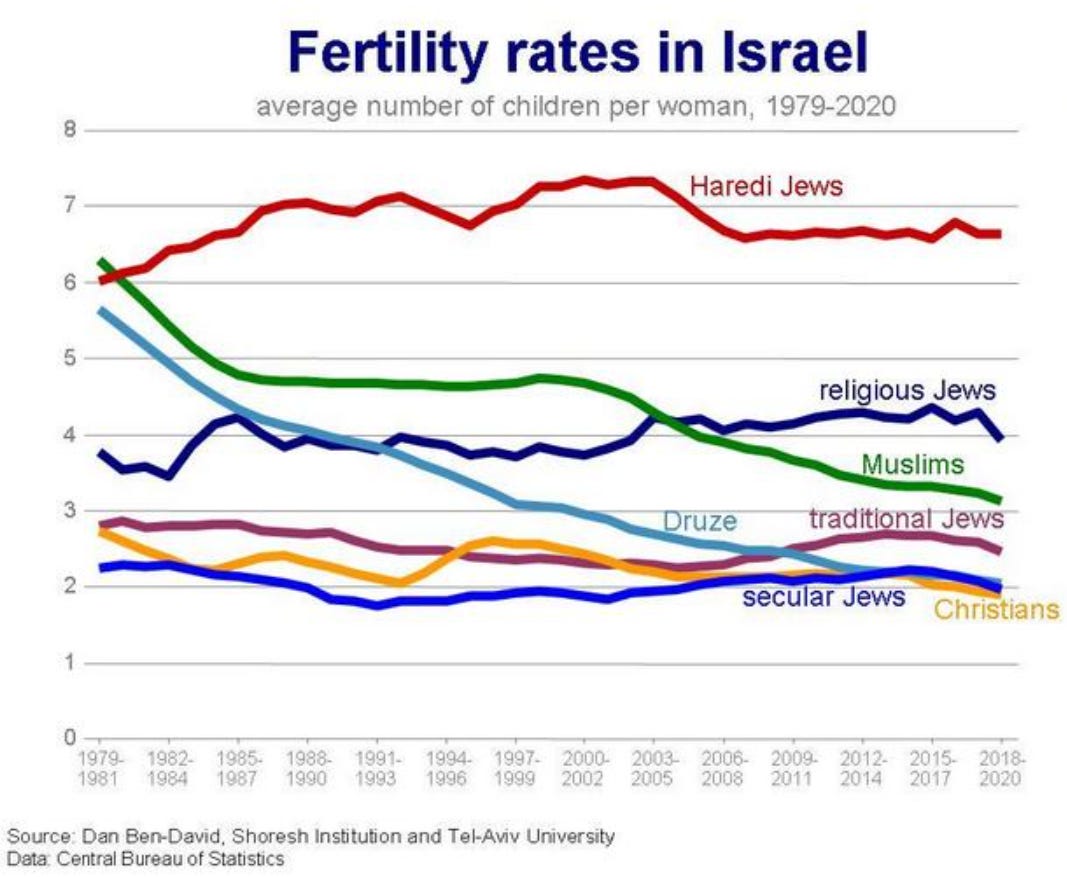Understanding High Israeli Fertility
Israel is the only developed country in the world with above-replacement fertility. Understanding why is crucial for knowing how we can solve the low birthrate crisis.
Near the end of 2023, I was honored to be a guest in the home of a prominent rabbi in the DC area who had recently passed, at a ceremony of mourning and remembrance, even though I am not Jewish. Most of his family lives in Israel and his granddaughter told me he had more than one hundred descendants when he died. This was more than anyone else I knew of and speaks to the remarkable fertility of an unusual country.
Israel's Fertility and Why It's So Significant
There are 38 countries in the Organization for Economic Co-operation and Development (OECD). These are generally considered to be the most modern and developed nations. Of these, 37 have fertility that is below replacement, and most are far below replacement. Only one advanced country, Israel, has above-replacement fertility.
As countries get richer, fertility usually falls, for reasons we all understand. Long educations mean that more of the childbearing years are spent in school. Greater freedom and opportunity for women, the demands of work, the availability of birth control and urbanization all contribute to low birthrates in advanced countries.
All of these descriptors apply to Israel as much as any country. Yet somehow Israel manages to have a fertility around twice the OECD average, close to three births per woman. Israel is the only advanced country on Earth with a population pyramid that shows growth. In every other, the pyramid is inverted, meaning that a country is decaying with time.
I recently wrote about the new Baby-Money Index (BMI), a substitute for GDP which multiplies income by the square of fertility to give a measure of true national thriving. A successful nation has both present prosperity and is producing the next generation.
https://x.com/MoreBirths/status/1865441274846720361
On the combined measures of income and fertility, one nation is far ahead of the rest. Israel's score laps every other country in this index. High fertility countries usually have very low GDPs and high GDP countries usually have very low birthrates. Israel is the only country in the world that does well in both categories.
We need to understand what is different about Israel if we hope to turn our own plunging fertility around. Let's look at a range of factors.
Israel and Education
Israel is one of the most educated countries on Earth, and a majority of its citizens hold at least a college degree. High education is usually associated with low fertility, so Israel is unusual in this regard. Canada, the most educated country, has a TFR of just 1.25 births per woman. Every country on the list below other than Israel suffers from low birthrates.
Israel's Housing Situation
Both high housing prices and urbanization are associated with lower birthrates, a pattern that I have documented extensively, and which is widely accepted in demography. Yet Israel is both dense and extremely expensive. Housing costs more per square foot in Israel than in any country in Europe. Yet Israel's fertility is far higher than that of any European country.
War, Nationalism and External Threats?
One theory says that Israel has high fertility because it is threatened by enemies. That may be true to an extent. But no country has faced greater existential threat in recent years than Ukraine. It has responded with a remarkable defense and a resurgent national identity. Yet Ukraine's fertility hovers near 1 birth per woman. Azerbaijan too is characterized by war and issues around national identity. Its fertility is also far below replacement.
And let's not forget that South Korea, the lowest fertility country in the world, lives under constant threat from the North.
Is it Religion?
A 2009 Gallup poll surveyed people in different countries, asking if religion is "important in your daily life." By this measure, Israel's religiosity was only average compared to European countries and much less than countries like Poland and Italy, each of whom has fertility near one birth per woman.

By religious attendance too, Israel is unremarkable. Just 27% of Jewish people in Israel attend a religious service each week, a bit more than in the United States. Of course, religion tells part of the story of high Israeli fertility but it doesn't tell the whole story.
Yes, the Ultra-Orthodox in Israel have very fertility, but they are just a small subset of the population. Fertility is high in all segments. Secular Jews in Israel have a fertility of about 2 births per woman, twice as high as the one birth per woman of secular Jews in the United States.
Is it social services?
Israel offers a variety of benefits around childbearing, from tax relief to child allowances. That is a good thing, and no doubt provides some boost to fertility. But what Israel offers in terms of benefits is pretty average compared to European social democracies. Sweden, Germany and South Korea all spend significant sums on pro-natal benefits and their most recent fertility rates were 1.42, 1.36 and 0.73 respectively.
"Getting married and having kids is the highest cultural value"
Ultimately, those who live in Israel or talk to Israelis almost always arrive at the same conclusion. Israeli culture just values having children intensely. A wonderful article by Dina Kraft in The Christian Science Monitor sheds light.
Another wonderful article, by Danielle Kubes in Canada's National Post, offers precisely the same explanation for high Israeli fertility: Israel is positively dripping with pronatal belief.
If you talk to Israelis and if you visit Israel, you will arrive at the same conclusion. Israel just has far stronger pronatal beliefs than are found in any other developed country and this is the main reason its fertility is higher.
Where did this pronatalism come from? It was intentional. Early Israeli leaders like David Ben Gurion and Golda Meir were intensely pronatal, speaking in direct language about the importance of having children. Subsequent leaders have continued to uphold these values and have added policy supports.
Most of all, Israel has never wavered in its pronatalism. While generations around the world (and especially in East Asia) were hearing the message that the world is overpopulated, Israel kept its core belief in the value of children.
A remarkable example of Israel's pronatalism
Late last year, Israeli newspaper Haaretz reported something which was astonishing to those of us learning about it for the first time, under the headline, 'We Operate 24/7.'
Israel is so pronatal that your family and hospitals will work together to make it possible for you to have children even after you have died!
Hope for the rest of us
The fact that Israel manages high fertility in spite of many negative forces means there is hope for every wealthy, low-fertility country. Israel manages this most of all through intense belief in having children, very simply. Other countries can have that too, if they work at it hard enough. In August I reported how Mongolia developed cultural pronatalism and saw birthrates soar, in very different circumstances.
https://x.com/MoreBirths/status/1827418468813017441
With strong pronatal belief, almost every headwind can be overcome. Without that, even generous government spending on families is unlikely to succeed at raising fertility that much.
Fertility is a stack of factors, but pronatal belief matters most
I have written of the Fertility Stack, a whole range of factors that drive fertility, in this post:
https://x.com/MoreBirths/status/1867319128794546235
Israel does poorly on a number of metrics. In particular, housing is crowded and expensive, and educations are very long. Does that mean that those other factors don't matter?
In fact, they do matter and if Israel could address these things, it could have higher fertility still. Israel has high fertility for an OECD country, but its fertility is far from what is possible. I wrote about the Amish almost two months ago. The Amish also have strongly pronatal beliefs and have shorter educations and have plenty of space and affordable housing and have plenty of economic opportunity in America, and so Amish fertility is six births per woman!
https://x.com/MoreBirths/status/1851753530387743172
Risks to Israeli Fertility and What Israel Can Do
The biggest risk to Israeli fertility going forward is if it wavers in its pronatalism. In the first month with data showing babies born more than nine months after October 7th, 2023, Israel reported an 8% decrease in Jewish births compared to the previous two years. If Israel's view of itself changes or the intensity of its pronatalism diminishes, it could succumb to the low same fertility that threatens every other developed country. While other countries need to learn Israel's strongly pro-child ethos, Israel needs to work hard to maintain it.
The second biggest risk to Israeli fertility going forward is housing. Israel's crowding and house prices are extreme. Israeli fertility would no doubt be higher without this constraint. But southern Israel is not crowded. Even tiny Israel has room to grow, and it will need that space in the decades to come, having just passed ten million in population last month.















